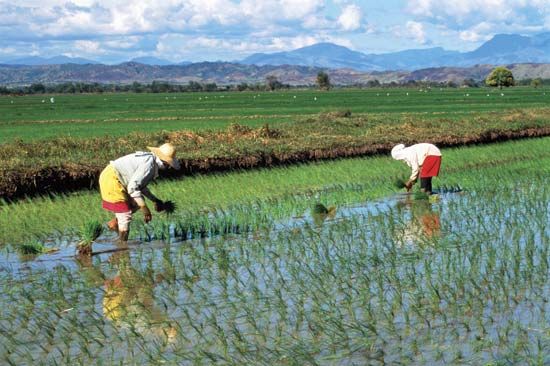Japanese rice farmers upset over broad TPP agreement

The Mainichi | 6 October 2015
Japanese rice farmers upset over broad TPP agreement
Many farmers in Japan have started to feel increasingly insecure about their future as 12 Pacific Rim countries including Japan reached a broad agreement on the U.S.-led Trans-Pacific Partnership (TPP) free trade initiative.
It has been about two years and seven months since Prime Minister Shinzo Abe announced his government’s decision to take part in TPP negotiations. The broad TPP agreement, designed to liberalize trade and investment among the 12 countries including Japan and the United States, was reached after lengthy jockeying over the interests of participating nations. Overall reactions to the agreement are mixed. Some people are happy about the deal because imported goods will be available at cheaper prices, while some fear that the deal could have a huge negative effect on farmers.
Yasunori Tezuka, 60, who grows rice on a 12-hectare paddy field and strawberries on a 42-hectare field in Utsunomiya, Tochigi Prefecture, angrily said, "What was the Diet resolution which said, ’We will not touch agricultural products, particularly rice’?" Last year when Japan had a bumper rice crop throughout the country, the advance payment farmers received from agricultural cooperatives fell to a record low of 8,000 yen per 60 kilograms of first grade "Koshihikari" rice harvested in the prefecture. As Japan continues to have a surplus of rice, Tezuka said worriedly, "I have been placing expectations on local Liberal Democratic Party (LDP) legislators and others who repeatedly said that ’rice is a sacred area,’ but if imported rice increases further, a further price fall will be unavoidable."
Makio Suzuki, 66, who grows "Akitakomachi" rice and other rice for stockpiling on a 5-hectare field in Akita city, Akita Prefecture, said, "The government’s assertion that it will turn domestic agriculture into a growth area is a lie. There remain other procedures such as ratification in the Diet. I would like to continue to express my opposition through demonstrations and rallies."
Yuji Taniguchi, a 44-year-old rice farmer in Asahikawa, Hokkaido, was also disappointed by the TPP agreement. While being swayed by the government’s acreage reduction policy, he borrowed 15 hectares of land in addition to an 8.5-hectare field he had taken over from his father. He plans to borrow four more hectares of land. But he has to do extra work such as weeding in dispersed paddy fields and transporting farm equipment there. He manages to make ends meet by grants such as subsidies allocated to rice-growing regions. "There is a limit to the expansion of scale," he deplored.
Meanwhile, Tatsuya Sasadaira, a 39-year-old farmer in the Nagano Prefecture city of Tomi who exports rice he grows outside the framework of the acreage reduction policy, said, "If domestic prices fall due to the TPP, there is a possibility that there will be an increase in the number of farmers who consider exporting rice to foreign countries where demand is high." As domestic rice demand had hit a peak, Sasadaira started exploring the possibility of exporting rice in 2013 and shipped about 160 metric tons of rice to foreign countries such as Australia in 2014.
Nevertheless, because the government decided to scrap the acreage reduction policy in three years from now, if measures such as rice-crop diversion subsidies are reviewed, the business environment for rice farmers could drastically change for the worse. Sasadaira said, "Rice prices have been tossed about by the government’s policies, but I cannot make any investments or hire people unless I can foresee the future 10 years from now. I want the government to show an unshakable long-term vision."





